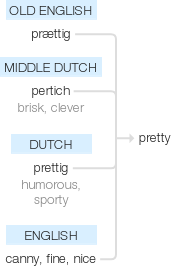Pretty
Old English prættig ; related to Middle Dutch pertich ‘brisk, clever’, obsolete Dutch prettig ‘humorous, sporty’, from a West Germanic base meaning ‘trick’. The sense development ‘deceitful, cunning, clever, skilful, admirable, pleasing, nice’ has parallels in adjectives such as canny, fine, nice, etc.
wiktionary
From Middle English prety, preti, praty, prati, from Old English prættiġ(“tricky, crafty, sly, cunning, wily, astute”), from Proto-Germanic *prattugaz(“boastful, sly, slick, deceitful, tricky, cunning”), corresponding to prat(“trick”) + -y. Cognate with Dutch prettig(“nice, pleasant”), Low German prettig(“funny”), Icelandic prettugur(“deceitful, tricky”). For the sense-development, compare canny, clever, cute.
etymonline
pretty (adj.)
Middle English pratie "cunning, crafty, clever" (c. 1300 as a surname), from Old English prættig (West Saxon), pretti (Kentish), *prettig (Mercian) "cunning, skillful, artful, wily, astute," from prætt, *prett "a trick, wile, craft," from Proto-Germanic *pratt- (source also of Old Norse prettr "a trick," prettugr "tricky;" Frisian pret, Middle Dutch perte, Dutch pret "trick, joke," Dutch prettig "sportive, funny," Flemish pertig "brisk, clever"), a word of unknown origin.
The connection between the Old English and Middle English words "has several points of obscurity" [OED], and except in surnames there is no record of it 13c.-14c., but they generally are considered the same. The meaning had expanded by c. 1400 to "manly, gallant," also "ingeniously or cleverly made," to "fine, pleasing to the aesthetic sense," to "beautiful in a slight way" (mid-15c.). Also used of bees (c. 1400). For sense evolution, compare nice, silly, neat (adj.), fair (adj.).
Pretty applies to that which has symmetry and delicacy, a diminutive beauty, without the higher qualities of gracefulness, dignity, feeling, purpose, etc. A thing not small of its kind may be called pretty if it is of little dignity or consequence: as a pretty dress or shade of color; but pretty is not used of men or their belongings, except in contempt. [Century Dictionary, 1897]
Of things, "fine, pleasing" 1560s. Ironical use is from 1530s (compare ironical use of fine (adj.)). The meaning "not a few, considerable, moderately large in quantity, number, extent, or duration" is from late 15c. Pretty please as an emphatic plea is attested from 1902. A pretty penny "lot of money" is recorded from 1703.
pretty (v.)
"to make pretty," 1916 (transitive), usually with up (adv.); intransitive sense by 1932; from pretty (adj.). Related: Prettied; prettying. Compare prettify.
pretty (n.)
"a pretty person or thing," 1736 of things, by 1773 of persons, from pretty (adj.). Prettinesses "pretty things, etc." is attested from 1640s.
pretty (adv.)
"to a considerable extent," expressing a degree less than very, 1560s, from pretty (adj.). Pretty much "in a considerable degree" is by 1660s.
